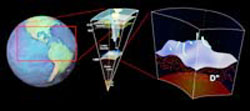Doing a little now to mitigate long-term climate change would cost much less than doing nothing and making an adjustment in the future, say scientists whose paper appears in the Oct. 15 issue of the journal Science.
Implementing a carbon tax of five cents per gallon of gasoline and gradually increasing the tax over the next 30 years is the optimal solution, the researchers report. “You can think of the tax as a low-cost insurance policy that protects against climate change,” sa
On Jan. 14, 2005, the Huygens probe will plow into the orange atmosphere of Saturn’s moon, Titan, becoming the first spacecraft to attempt to land on a moon in our solar system since the Soviet Union’s Luna 24 touched down on Earth’s moon in 1976.
Though scientists hope that Huygens will survive the plunge, it will be flying blind through hydrocarbon haze and methane clouds to a surface that could consist of seven-kilometer-high ice mountains and liquid methan
The proposed construction of a European Arctic Flagship ‘AURORA BOREALIS’, the 250 Million Euro joint European Research Icebreaker with a deep drilling capability would result in a considerable commitment of the participating nations to coordinate and expand their Polar Research Programmes. Recent results from drilling of the Deep Arctic Ocean within the Arctic Coring Expedition (Acex) have revealed dramatic changes of climate in the Arctic region during the last 55 million years. European science
Vilified in popular culture as a relentless man-eater, the great white shark finally received today global recognition as a persecuted species worthy of protection, as participants of the 13th meeting of the Convention on International Trade in Endangered Species of Flora and Fauna (CITES) adopted a proposal to improve management and monitoring of trade in jaws, teeth and fins from the world’s largest predatory fish. Led by the governments of Madagascar and Australia, the proposal to list the
Based on 18 months of Envisat observations, this high-resolution global atmospheric map of nitrogen dioxide pollution makes clear just how human activities impact air quality.
ESA’s ten-instrument Envisat, the world’s largest satellite for environmental monitoring, was launched in February 2002. Its onboard Scanning Imaging Absorption Spectrometer for Atmospheric Chartography (SCIAMACHY) instrument records the spectrum of sunlight shining through the atmosphere. These

At the surface of Earth, life on a geologic scale is calm and peaceful save the occasional earthquake caused by the rub and slip of Earth’s tectonic plates. But below Earth’s surface, scientists are beginning to find a far more dynamic and tumultuous region than previously thought.
Deep inside Earth, where the mantle meets the molten iron core, researchers are finding telltale signs of what could be a highly active area filled with exotic forms and substances. “This layer is far